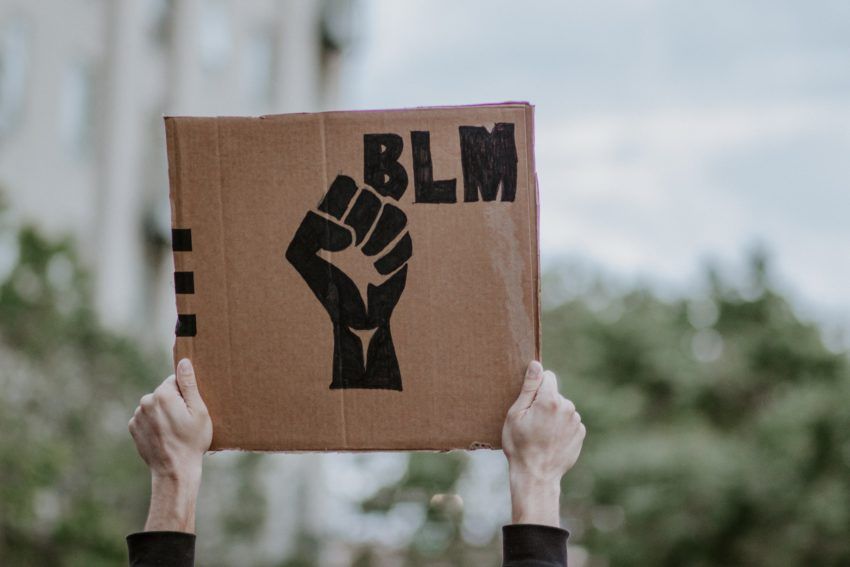In this piece journalist Linn Nyrvik urges her white peers to be true allies in the workplace by becoming proactive anti-racists instead of passive not racists
The murder of the black unarmed and innocent man George Floyd in the USA on May 25, has left many people shocked, sad and with an urge to do something.
It can be challenging to know what to do and where to start. The situation of racial injustices is a global issue and not only an America issue. In the UK, only 3% of the most influential and powerful people have a black or minority background highly educated middle-aged black people are referred to as being “street”, and black people are four times more likely to die of the coronavirus.
These are just a few examples of why we white people, in the UK and elsewhere, need to educate ourselves and become more aware both within ourselves and at our workplace to be active anti-racists instead of passive “not-racists”. Here are four ways to start the journey of being a real ally and contribute to real change in society.
- Make anti-racist practice a lifestyle
Saying “I am not racist” or “I have black friends” or “I don’t see colour” is a passive act and is just not enough. If you don’t understand the depth of it, ask yourself how old you were when you realised you were white, and ask the black people around you how old they were when they realised their skin colour mattered, and you will see how much it actually matters.
White and western perspectives of history, lifestyles and culture are the status quo of the general society, something most of us rarely reflect over, which is why it is so important for White people to be active anti-racists.
As the author Ijeoma Oluo wisely said: “Your survival has never depended on your knowledge of white culture. In fact, it’s required your ignorance.” So, to be an active anti-racist, we need to rewire our brains and to change the perspective of what we see as the “norm”.
The first step is to relearn history, focusing on the perspective of black people. There are tons of recourses out there, focusing on black history and black perspectives. The Netflix documentary 13th, the Black History Podcast” and the blog antiracismforbeginners.com is a good start.
2. Sit in the feeling of discomfort and take the time to process.
As white people, we are not used to referring to ourselves with our skin colour, and most of us probably see ourselves as good people. As Robin DiAngelo, says in her book White Fragility, (which I highly recommend, by the way); it is two key elements for why white people have a hard time seeing ourselves as a white collective. The first element is the focus on individualism; the other one is the focus on objectivity. Both of which, according to DiAngelo, is an illusion.
When white people are challenged on their whiteness or are faced with the reality of racial injustices (such as the current murder of George Floyd), feelings of discomfort, shock, sorrow or shame are common, normal and healthy. Through these feelings of discomfort, we can build our stamina to use our voice to speak up against racism, to teach our lesser aware friends and to gain further understanding and empathy and to be genuinely active anti-racists.
To process our feelings when seeing racial injustices or having our world view challenged is one of the key elements white people can do to help to put a stop on racial discrimination and violence.
3. Listen to black people, talk to white people.
Most likely, black people already know the collective pain of black history, racism and the ignorance/unawareness from white people. They don’t need to hear your perspective of it; they don’t need to hear that you just became “woke”.
It is not fair of us to share our newly awaken pain, emptiness and shock with black people, as they probably have known this since they were kids. In the article 75 things white people can do for racial injustices it highlights the importance of listening to black people “without ego and defensiveness to people of colour. Truly listen. Don’t scroll past articles written by people of colour — read them.”
Talk to other white people when they are ignorant or saying offensive comments, ask them “why do you think so?” or “what is your intention by saying this?”. It will be uncomfortable, yes, but we must value black lives more than the avoidance of discomfort.
4. Supporting black businesses and donate for black justice.
As a part of our society, money is power. That is why we need to be active consumers and mindfully be buying from black businesses. The five wealthiest people on earth are white men. Black-owned businesses face economic challenges, especially during this current pandemic, and by buying from black businesses, we make it easier to close the racial wealth gap and to strengthen black communities.
Here you can find 52 black-owned fashion brands and the platform UK Black Owned Businesses provides a thorough index on a variety of businesses with black owners. Furthermore, by the current global demonstrations, the anti-racist movement needs donations to survive and to have the stamina to continue making a change. Here are 14 organisations in the UK to donate to.
And with all this said, I have just repeated the words from what tons of black people have said before me. Sadly, white people tend to listen more to their fellow whites than black people, even if we just repeat what they have said for decades.
This article first appeared on Diversity Q, a sister publication to ESG Clarity








